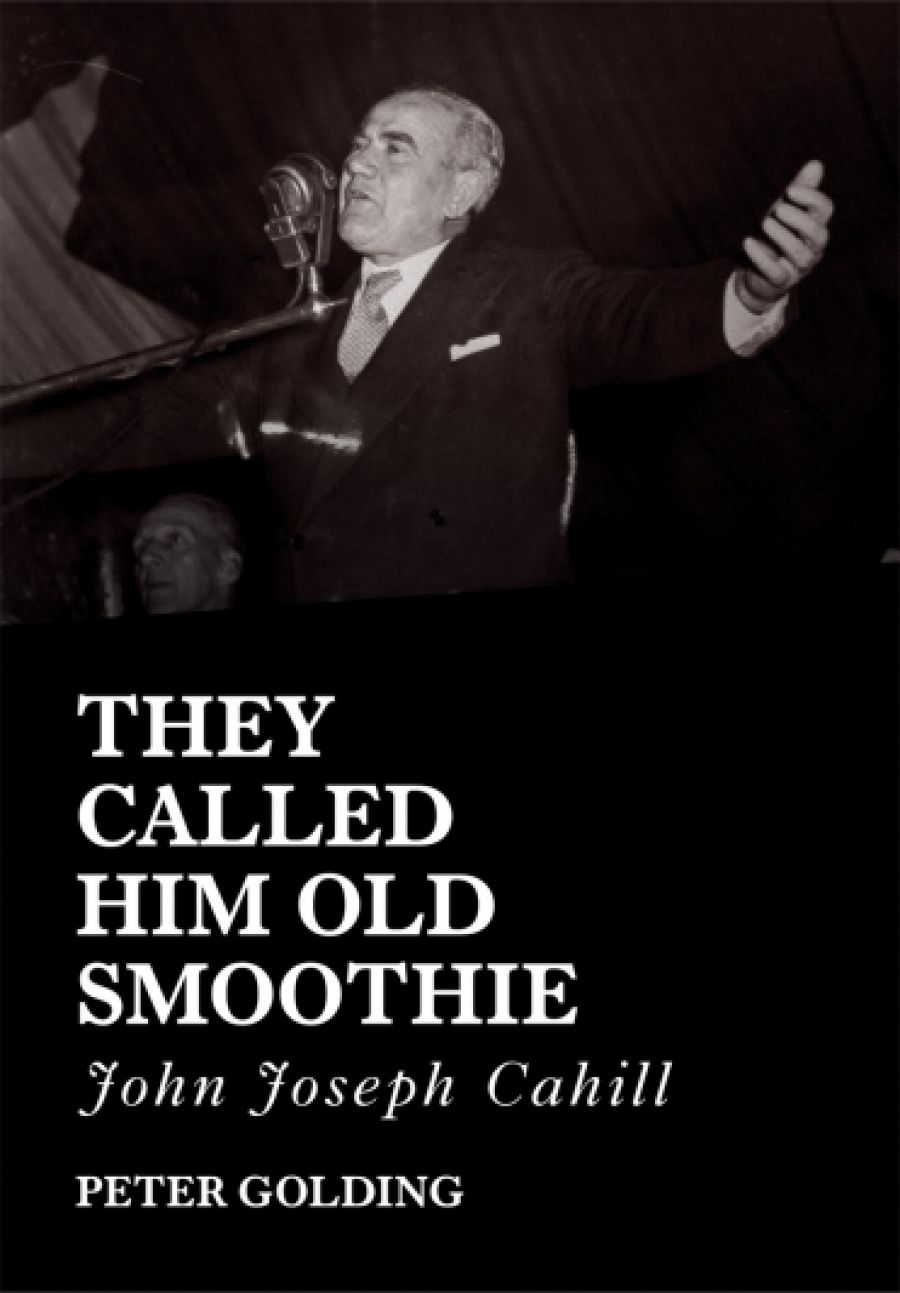
- Free Article: No
- Contents Category: Biography
- Custom Article Title: Lyndon Megarrity reviews 'They Called Him Old Smoothie' by Peter Golding
- Review Article: Yes
- Article Title: The discreet charm of Old Smoothie
- Online Only: No
- Custom Highlight Text:
John Joseph Cahill (1891–1959) rose from humble beginnings as a railway worker to become the premier of New South Wales during the 1950s. Although more interested in listening to band music on the wireless than in anything approaching High Culture, he was nonetheless instrumental in championing the cause of the Sydney Opera House. Ordinary working people, he believed, were entitled to more than just the essentials of life. Peter Golding’s intriguing biography will introduce many people to the life and career of this rough, politically hardened but fundamentally decent Labor politician.
- Book 1 Title: They Called Him Old Smoothie
- Book 1 Subtitle: John Joseph Cahill
- Book 1 Biblio: Australian Scholarly Publishing, $49.95 pb, 484 pp
Like many biographies, They Called Him Old Smoothie is overlong. It includes many irrelevant details, incidents and scraps of hearsay that should have been ruthlessly cut during the editing process. A short book, concentrating on hard evidence, would have been more appropriate for a taciturn biographical subject like ‘Old Smoothie’. A discreet man not inclined to overt self promotion, Cahill kept limited records and seems not to have done much chatting about the dark art of politics to family and friends. While interviews with the Cahill family and old colleagues have filled in some of the gaps, the thinness of the source material makes it difficult for the reader to obtain more than a shadowy understanding of what Cahill achieved as a public figure.
Indeed, Old Smoothie often gives the impression of being a general his-tory of the parliamentary Labor Party in New South Wales, with Cahill being relegated to cameo appearances. There are lengthy contextual passages concerning the labour movement’s internal battles with communist and Catholic activists during the 1940s and 1950s, and federal ALP leader H.V. Evatt’s increasingly irrational political actions, as well as detailed chronicles of premiers such as Jack Lang and William McKell. Because Cahill the parliamentarian seems to have avoided political intrigue and nasty personal quarrels as much as possible, it is surely difficult for Golding to justify all the attention given to Labor’s internal disputes at the expense of Cahill. It is also a little hard for the reader to work out how much Cahill personally achieved as a postwar minister, and how much was the result of his being sensible enough not to interfere overly with the work of public servants with depart-mental expertise.
There is much, however, to enjoy in this book. Golding, a highly experienced journalist and biographer, has an eye for the telling detail and an ear for a poignant quote. The author interviewed more than fifty people during his research, and the book’s greatest success is in creating a vivid picture of Cahill as a family man and private citizen. In today’s political environment, where politicians often seem cut off from the people they represent, there is something appealing about Cahill’s determination to continue a relatively normal life as a politician: enjoying a bet on the races, watching football and spending time with his extended family, in Marrickville. There is a charming description of Cahill regularly playing cards with his relatives and getting his nephew to play his hand for him while he dealt with telephone callers. Above all, Golding vividly creates an image of a more relaxed Australian political system before the era of the twenty-four-hour news cycle.
To his credit, the author largely avoids presenting Cahill as a kind of secular saint. It would appear that Cahill was not averse to doing a somewhat contentious deal with his predecessor to get his hands on the premiership; he was also adept at identifying and neutralising political problems that he knew would attract adverse media attention. Like most leaders, much of Cahill’s time was spent shoring up power, maintaining party unity, reacting to immediate pressures and ensuring that his government was in a position of electoral strength. Cahill the ‘big picture’ man, supporter of the Sydney Opera House, the Snowy Mountains Scheme and National Parks, seems a totally different person from Cahill the political warrior and diplomat.
Curiously, while the book uses Cahill’s support for the creation of a Sydney Opera House as a major selling point, it is not a prominent part of the text. It is hard fully to accept Golding’s (and Cahill’s) contention that Cahill’s obsessive determination to get the project started, yesterday if possible, was largely about giving The People access to the finer things in life as well as material well-being. Other interpretations are possible. Is it too fanciful to suggest that Cahill, like many ageing politicians, hoped to be remembered, and that a visual legacy of his years in office via a majestic building (rather than the Cahill Expressway) might be the icing on the cake? Could the increasing emphasis on government-sponsored, popular events during the 1950s (e.g., the royal tour of 1954 and the Melbourne Olympics) have convinced Cahill that being associated with the construction of a spectacular entertainment venue would be good for the ALP’s public esteem? Golding avoids such questions, preferring to accept Cahill’s public utterances at face value.
Golding is an accomplished writer who balances his love of oral history with sound scholarship. While his biography of Cahill ultimately lacks focus, there is no denying the author’s passion for Australian political history. Old Smoothie, generously illustrated, will be of particular interest to Sydney residents with an interest in their city’s political past.


Comments powered by CComment